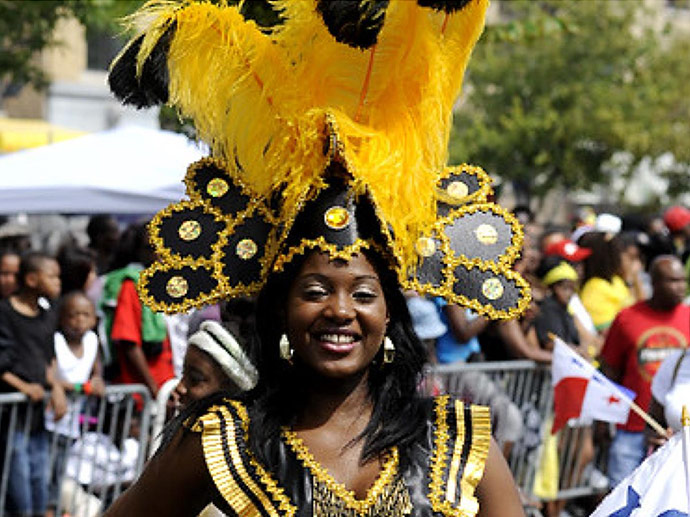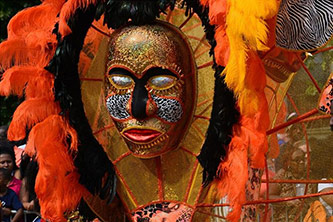Program: Caribbean Studies
The Caribbean Studies Program has been a part of the Brooklyn College curriculum since fall 1979. The program grew out of a cooperative interdisciplinary spirit, and by spring 1980, it had gelled as a consortium of the departments of Africana Studies, History, Modern Language-Spanish, Political Science, and Sociology. The directorship of the program rotated between the cooperating departments for many years. Professors such as Sam Faber (Political Science), Margarite Fernández Olmos (English), Antonio Stevens Arroyo (Puerto Rican and Latino Studies), and Hobart Spalding (History) were key to sustaining the program in its earliest years.
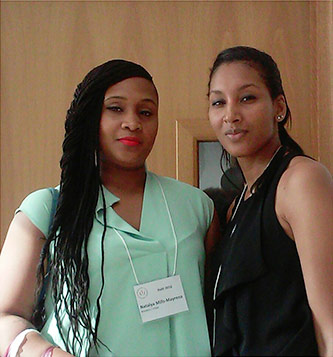
CAST part-time instructors Natalya Meyrana and Aleah Ranjitsingh at the 2017 Caribbean Studies Conference in Haiti.
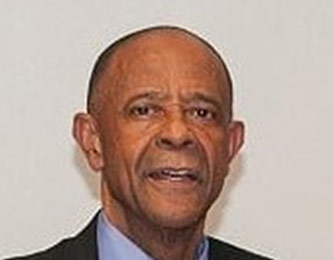
Professor Cuthbert Thomas, former director of the Caribbean Studies Program.
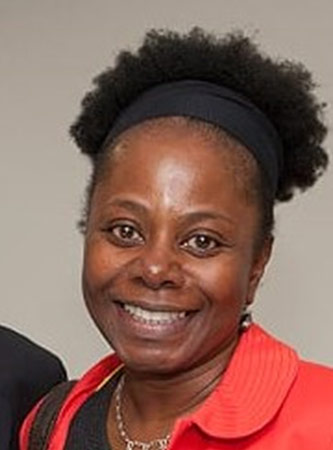
Assistant Professor Dale Byam, current director of the Caribbean Studies Program.
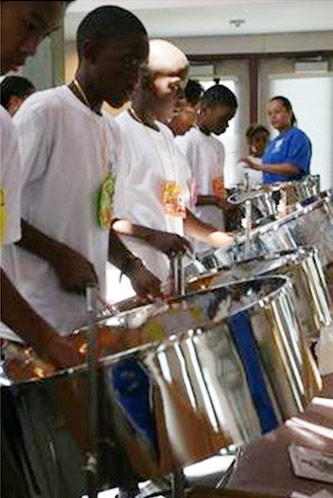
The steel pan is the only instrument born in the Caribbean, and the program holds events where you can learn how to play it.
From the beginning until now, students can earn either a co-major or minor in the program. To satisfy the co-major requirements, students were originally required to take 18 approved credits in three of the six departments participating in the program. And for a minor, students had to take four approved three-credit courses. Additionally, all students had to take Caribbean Studies 1.1 and an approved seminar. The curriculum no longer requires a distribution among all six departments, as History, Modern Languages and Literatures, and Political Science no longer actively participate. However, the 18 credit co-major requirement is still in effect.
Curricular innovations have always been key to the program. In the early days of the program, the Puerto Rican and Latino Studies Department added two new courses for students to participate in the program, one each on Dominican and Cuban immigrants. Similarly, the Africana Studies Department added a new course devoted to exploring the Haitian-American experience. Those courses reflected the changing demographics of the Brooklyn College student community and its altered ethnic dynamics. Though the program started out with a focus on the economic, political, and social issues in the Caribbean, now, in addition to those subject areas, students can focus on topics such as heteronormativity in the Caribbean or climate change and climate justice in the Caribbean.
Over the years, to anchor the program, two stand-alone courses were developed. CAST 1001 Major Themes in Caribbean Studies introduces students to central issues such as the plantation system, colonization, and immigration. Those topics and many others are covered in depth in CAST 3900 Special Topics in Caribbean Studies, whose focus varies from semester to semester. But several other new co-listed courses were developed for the program, including CAST 2300 Urban Caribbean Diaspora, CAST 3118 Caribbean Sexualities, and CAST 3000 Caribbean Carnival: History, Performance, Resistance. Numerous other courses from departments such as Political Science, English, and Africana Studies can be used to fulfill the required 18 credits for a co-major.
Professor Cuthbert Thomas, a political scientist and member of the Africana Studies Department, directed the program for more than 20 years after the original pattern of rotating chairs was abandoned. A Caribbean area specialist, Thomas was an active member of the Caribbean Studies Association, serving on its board of directors and as its president. Having immigrated from Dominica, Thomas focused not only on the politics of the Caribbean, but on issues affecting Brooklyn's Caribbean immigrant population. Besides publishing and presenting papers at conferences, he made regular presentations to student groups and was a resource person for Caribbean programs on both radio and television. After Thomas stepped down in 2012, the program was overseen by Professor Tamara Mose (Sociology) and then Jason Frydman (English).
Currently, the program is directed by Assistant Professor Dale Byam (Africana Studies), an African diaspora performance studies specialist. In an interview, Byam noted that although the number of co-majors remains relatively small, she hopes to add more. She acknowledged that more often than not, students come into the program thinking they know everything about the Caribbean because they may have grown up in the Caribbean or have parents who were born there.
However, the courses offered by the program provide a great deal more depth and breadth about the many Caribbean countries, as well as the region as a whole, than any student nonspecialist could ever imagine.
For example, the program features courses that critically consider the culture, politics, music, and family structures in the Caribbean and its diaspora in North America. Climate Justice in the Caribbean is a new course, introduced only a year ago. Byam developed the course and organized a conference exploring many of its attendant issues.
Carnival is a huge part of the program! Byam has offered the course, Caribbean Carnival: History, Performance, Resistance, in conjunction with local practitioners preparing for Brooklyn's famous West Indian American Day Parade.
Byam is planning to host a film festival next semester. Ideally, the movies will be short, but informative and of a sufficient length to include question and answer sessions, recommendations, and feedback. Professors and students from other departments will be the target audience.
You do not have to be from the Caribbean to add this major. The Caribbean is a diverse place filled with much culture and tradition. Learning about this area will enhance your understanding and knowledge about the Caribbean people. As the city and the borough with one of the largest Caribbean populations in the world, it's only appropriate that studying this region is a part of what we do!


